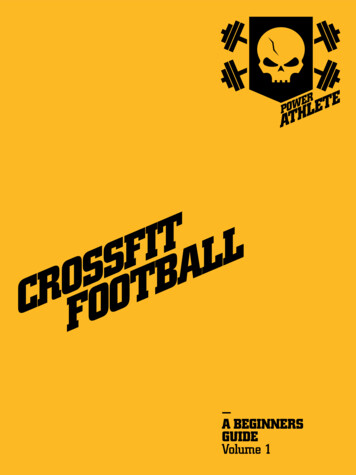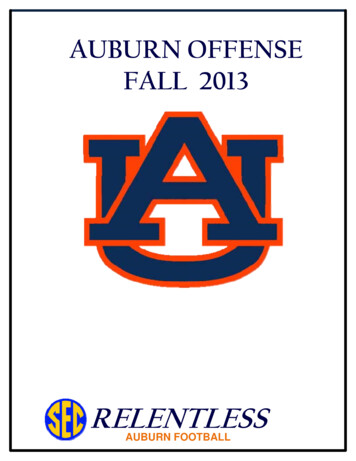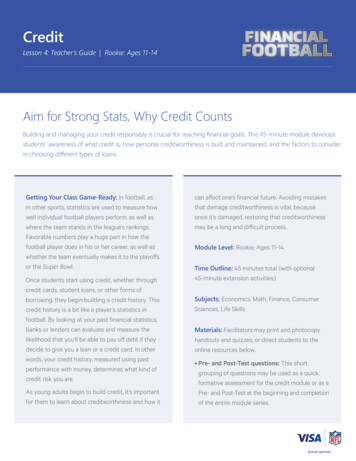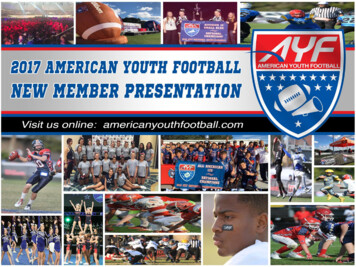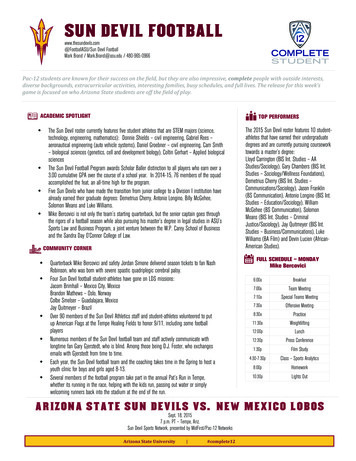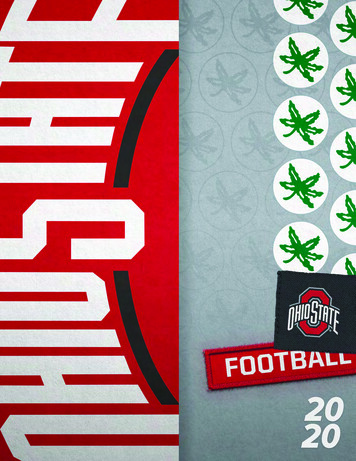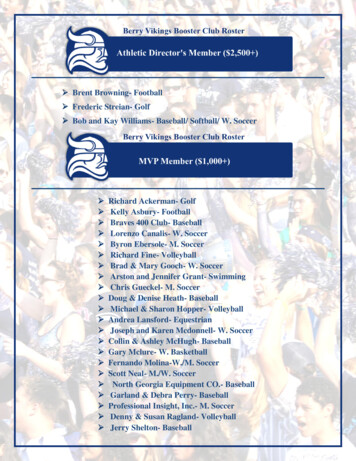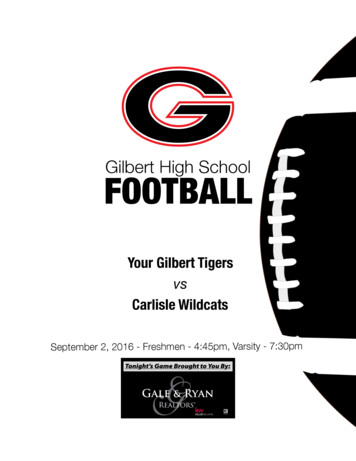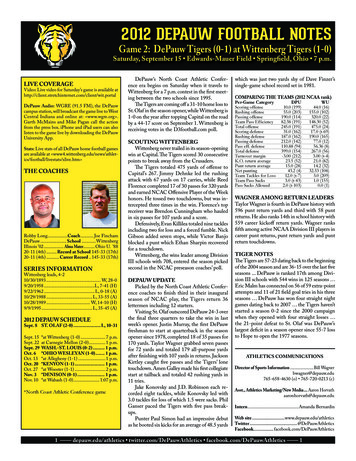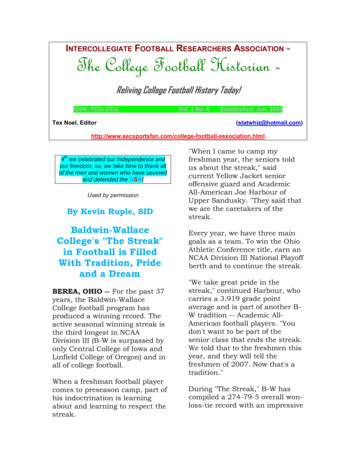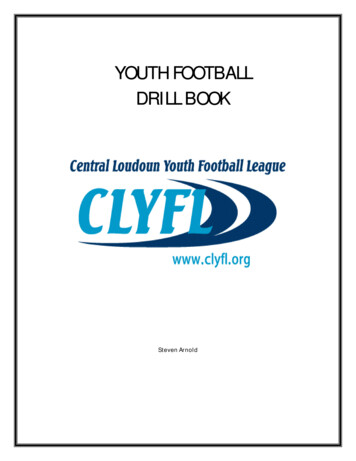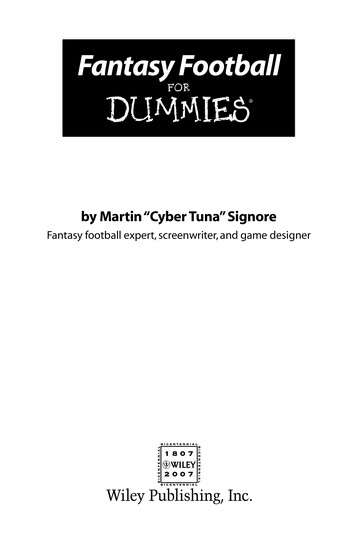
Transcription
FOOTBALLAction on the Gridironby Phyllis McIntosh
On any fall weekend across the UnitedStates, football reigns as the nation’s favorite sport. Thousands of high school teams,the pride of communities from coast tocoast, compete under the lights on Fridaynights. Saturdays feature the tradition andpageantry of college football. Sundaysbelong to the 32 professional teams thatplay in the major metropolitan areas.Professional games typically drawcrowds of 70,000 or 80,000, while somelarge universities pack their stadiums withupwards of 100,000 cheering supporters.Back-to-back broadcasts of both collegeand professional contests reach millions ofarmchair fans. Those for whom an entireweekend of football is not enough cantune in to yet another pro game on Monday Night Football, a staple of Americantelevision for the past 40 years.A rough and tumble game of sometimes violent physical contact, Americanfootball is not for the faint of heart.322010NumberAlthough it has roots in soccer and rugby,the sport as it is played today is purelyAmerican, having evolved through countless rule changes over the past 150 years.But football in the United States is morethan a game. For legions of fans, it is asource of school pride, a social event, andan integral part of holiday celebrations.Even though “football” means soccerin most parts of the world, the Americangame is catching on around the globe.College and professional leagues now existin a number of countries, from the UnitedKingdom to Japan.History of FootballPeople have been kicking and tossingballs around for thousands of years. As partof their military training, ancient Chinesesoldiers played a game known as TsuChu, which loosely translated means football. Likewise, Roman soldiers maintained4 En g l i s hTEa c h i n gFo r u m
their physical fitness through a rugby-likegame called harpastum, which they adopted from the Greeks. As the Roman Empireexpanded through Europe, its army sharedthe game with conquered peoples, especially in Britain, where it eventually gaverise to soccer and rugby.A rough tackle game using an inflatedcow bladder as a ball was popular in 11thand 12th century England, first amongyoung boys and later in violent contestsbetween rival villages. Casualties were sonumerous that several English kings outlawed the game. The sport eventually resurfaced in more organized form, and by theearly 1800s a game resembling modernsoccer was commonplace in English publicschools. As legend has it, the sport tooka new turn in 1823, when a player at theRugby School decided to pick up the balland run with it across the goal line. The ideacaught on, and the sport of rugby was born.Football in its various forms crossedthe Atlantic and became a favorite college sport. A soccer-style contest betweenRutgers University and the College ofNew Jersey (now Princeton) in 1869 isconsidered the first official intercollegiatefootball game, although the game playedthen would be hardly recognizable totoday’s fans. An 1874 match betweenHarvard University and Canada’s McGillUniversity popularized the combinationof kicking and running with the ball.In 1876, representatives from severaleastern schools created the IntercollegiateFootball Association to standardize rulesof play. But credit goes to one man—Walter Camp, a player and coach at YaleUniversity—for crafting rules that helpedshape the game as we know it. Known asthe father of American football, Campreduced the number of players on a team,established the line of scrimmage as thestarting point for each play, created theposition of quarterback as offensive teamEn g l i s hTEa c h i n gFo r u m leader, and instituted a system of downsfor advancing the ball. For the first time,the field was marked with yard lines, leading some to refer to it as a “gridiron.”Following Camp’s innovations, collegefootball grew rapidly, with 250 schoolsfielding teams by the turn of the 20th century. But football remained a brutal sport.With little protective gear for players anddangerous field formations that encouraged crushing physical contact, injuries andeven deaths were common. In 1905, afterseveral colleges banned the sport and others threatened to do so, President TheodoreRoosevelt called on schools to come upwith reforms to save the game. The resultwas an organization that in 1910 becamethe National Collegiate Athletic Association (NCAA), which continues to regulatecollege football today.Football FundamentalsAs decreed by Walter Camp, footballrequires two teams of 11 players each.The teams take turns trying to score byA quarterback, the offensiveleader of the team, getsready to pass the ball to areceiver down the field.Number4201033
moving the ball across the opponent’s goalline. The game consists of four 15-minutequarters, with a halftime break after thesecond quarter. But because teams can taketimeouts and a number of actions on thefield stop the play clock, games can lastthree hours or more.Play takes place on a field 53 yardswide and 100 yards long, with a goal lineat each end. Behind each goal line is a10-yard end zone with upright goal posts.Lines run across the field every five yardsand are numbered every 10 yards.The game starts with a kickoff. Thereceiving team plays offense and will havefour chances, or “downs,” to move theball forward at least 10 yards. If it succeeds, the team gets four new downs. If itfails, the other team gets the ball and triesto move it in the opposite direction. Anoffensive team that has failed to advance10 yards usually uses its fourth down topunt—that is, kick the ball down thefield, so the opposing team will have tostart its offense farther back.To begin each down, the offensivecenter lineman snaps the ball back to thequarterback, who throws it to a receiverAn upright goal post standsat each end of a footballfield. The field is 100 yardslong with lines runningacross the width every fiveyards, leading some to call ita “gridiron.”342010Numberdownfield (a forward pass) or hands it to ateammate who runs with it. The defensiveteam tries to tackle the quarterback or theplayer running with the ball and to prevent receivers from catching a pass. Theoffensive linemen attempt to block thedefenders from tackling their teammates.A team can score in several ways.The most desirable score is a touchdown,worth six points, which a team scoresby carrying the ball into the opponent’send zone or by catching it there. After atouchdown, the scoring team can earn oneextra point by kicking the ball throughthe uprights of the goal post or two extrapoints by passing or running the ball intothe end zone from the three-yard line. Ifthe offense cannot get close enough to theend zone for a touchdown but is inside theopponent’s 45-yard line, it may attempt afield goal—kicking the ball through thegoal post for three points. The defense canscore two points if it traps an opponentwith the ball in his own end zone, thoughthis happens infrequently.Because football involves constantphysical contact, players are clad head totoe in protective gear. All players wear aheavy helmet with face mask, mouth guard,and chin guard. Under their uniform jerseyand pants, they wear special pads that protect the shoulders, upper chest and back,ribs, hips, thighs, and knees.The football is elliptical in shape, about11 inches long and 22 inches around thecenter, and weighs 14 to 15 ounces. Thoughsometimes called a “pigskin,” a holdoverfrom days when a pig bladder was used asa ball covering, today’s football is made ofbrown cow leather stamped with pebblegrain texture to make it easier to grip.Football players, especially at the college and professional levels, specialize ineither offense, defense, or special teams.Special teams players, such as the punter orfield goal kicker, come onto the field onlywhen their particular skills are required.4 En g l i s hTEa c h i n gFo r u m
A football game begins witha kickoff. The team receivingthe ball then tries to advancethe ball back down the fieldin the direction from which itwas kicked.While individual skill is important,football requires a carefully coordinatedteam effort. And strategy is critical. Eachteam attempts to “read” the opponentand chooses its next move from amongdozens of well-rehearsed plays in theteam playbook. In advance of a game,teams spend long hours watching filmsof opposing players and coaches andplotting strategies.From Junior Leaguesto the Big TimeChildren as young as five can begin tolearn the basics of tackle football throughjunior leagues. By the time they are teenagers, many young competitors are playing onschool teams. Football consistently ranks asone of the most popular high school sports,with 15,000 teams and more than a million participants nationwide. High schoolteams are a source of immense communitypride, especially in Texas and other southern states, where games draw tens of thousands of fans. The best high school playersare recruited by colleges and universitiesand awarded scholarships to attend thoseschools and play on their teams.Under NCAA guidelines, colleges anduniversities play football in one of threeEn g l i s hTEa c h i n gFo r u m divisions; each division has many conferences, or groups of schools, that competefrequently against one another. Greatattention is focused on Division Iteams, mainly at large universities, where football is big business.Twenty of the largest stadiums in the countryare home, not toprofessional teams,but to college teamssuch as Pennsylvania State Universityand the University ofMichigan. Some long-timecollege coaches earn morethan a million dollars a year, as muchor more than some professional coaches.At the end of the regular season, thechampions of the various Division I conferences compete in bowl games on oraround New Year’s Day. The oldest of theseis the Rose Bowl in Pasadena, California,which began in 1902. Other warm weathercities soon launched their own bowl games,such as the Orange Bowl in Miami, theSugar Bowl in New Orleans, and the Cotton Bowl in Dallas. Some of these gamesare now part of the Bowl Championship Series, created in 1998 to determinea national champion of college football.Number42010Football is a game of strategy,and teams memorize andpractice plays like the onediagrammed on thischalkboard.A helmet and shoulder padsare among the protectivegear worn by footballplayers.35
A high school football playerruns with the ball asopponents topple aroundhim. Football consistentlyranks as one of the mostpopular high school sports.Children learn the basics of football in juniorleagues. Here a young player runs for a touchdownwhile members of the opposing team try to tacklehim.Upon graduation, the best college playersare drafted by the professional teams of theNational Football League (NFL).Now considered the pinnacle of thesport, pro football did not begin to rival362010Numberthe college game in popularity until a halfcentury after the first professional player,William “Pudge” Heffelfinger, received a500-dollar contract in 1892 to play for theAllegheny Athletic Association against thePittsburgh (Pennsylvania) Athletic Club.It was more than two decades later thatpro football found its first superstar—JimThorpe, renowned for winning both thepentathlon and decathlon at the 1912Olympic Games. After signing with theCanton, Ohio, Bulldogs in 1915, Thorpeled the team to three championships anddrew unprecedented crowds of 8,000 fansto Bulldogs games.In 1920, several pro clubs created aloosely organized league called the American Football Association, which electedThorpe as president and sold franchisesfor 100 dollars each. Two years later, thegroup changed its name to the NationalFootball League. In its early years, theNFL did little to create stability or winover fans. As teams came and went, pro4 En g l i s hTEa c h i n gFo r u m
football simply couldn’t compete withbaseball or college football.The 1958 NFL championship contestbetween the Baltimore Colts and New YorkGiants, celebrated in football lore as “theGreatest Game Ever Played,” is often citedas the turning point in pro football’s popularity. When Baltimore kicked a field goalto tie the score with 30 seconds remaining, the game became the first in NFLhistory to go into sudden death overtime.An estimated 45 million viewers who weretuned into the nationwide TV broadcast watched spellbound as quarterbackJohnny Unitas methodically led Baltimore80 yards in 13 plays for the winning touchdown. Overnight, Unitas and other stars ofthat game became household names, andwithin a few years, pro football ranked asAmerica’s favorite spectator sport.The sport’s popularity was fueled inpart by the creation in 1960 of the rivalAmerican Football League (AFL), whichfielded eight new teams and entered intoEn g l i s hTEa c h i n gFo r u m bidding wars with the NFL to draft themost promising college players. A decadeafter its founding, the AFL was absorbedinto the NFL, which was then divided intothe National Football Conference and theAmerican Football Conference. Currently,the two conferences comprise 32 teams infour divisions. At the end of the 16-gameregular season, a series of playoffs determines the champions of each conference,which then face off in the Super Bowl.Football’s AppealAt any level, football is fun to watchbecause of its fast-paced action, but muchof the sport’s appeal is in the hoopla surrounding it. Marching bands, acrobaticcheerleaders, and costumed mascots leadexcited fans in cheers and fight songs tourge their team on to victory. Halftimeshows feature bands marching in intricateformations or, at major bowl games, performances by musical celebrities.Number42010A Temple University player(#28) runs up the field afterintercepting a pass intendedfor the other team.37
vate homes to watch the game and sharetheir excitement with fellow enthusiasts.Some holidays, such as Thanksgiving andNew Year’s Day, which feature day-longbroadcasts of games, can be as much aboutfootball as traditional celebration.While baseball will always be knownas the national pastime, football, with itsincreasingly popular customs, has certainly earned its title—America’s Game.This statue of Jim Thorpe,pro football’s first superstar,stands in the rotunda of thePro Football Hall of Fame inCanton, Ohio.Fans attend a large tailgateparty before an Ohio StateUniversity football game.Football includes social events thatextend well beyond the grandstands. Highschools and colleges often hold pep ralliesthe night before a big game to rev up thefaithful with bonfires, cheers, and peptalks by the players and coach. Homecoming celebrations welcome alumni back tocampus for a weekend of parties, dances,and an important game, usually against anarchrival.Game day itself starts well before kickoff time as fans gather for tailgate partiesin stadium parking lots, where they cookfood on outdoor grills, listen to music,and visit with friends. Those who can’tattend the game in person congregatearound televisions in college dormitoriesor fraternity houses, sports bars, and pri-Talking Footballdown – the period of action that startswhen the offense puts the ball in play andends when the officials rule that the playis overfield goal – a play worth three points madeby kicking the ball through the goal posts;used on fourth down when the offensiveteam is close to the end zone or on anyother down when time is running outfumble – to lose hold of the football whilerunning with it or handling it; the teamthat recovers the ball gains possessionhuddle – players gathered in a circlebefore each down to hear instructions forthe next play from the quarterbackinterception – a pass by one team thatis caught by a player on the other team,which then takes possession of the ballline of scrimmage – the place on the fieldwhere a play begins; an official moves theball to this line before each down.punt – a kick made when a player dropsthe ball and kicks it downfield to movethe other team back; a team usually puntson fourth down after having failed to gain10 yards in three downs.rushing – use of running plays to movethe ball downfield on offensesack – tackling of the quarterback behindthe line of scrimmage, resulting in a loss ofyardage for the offense382010Number4 En g l i s hTEa c h i n gFo r u m
A marching band performsin the Tournament ofRoses Parade in Pasadena,California. The paradeprecedes the Rose Bowl, apost-season game betweentwo of the top collegefootball teams.turnover – a fumble or interception that Pro Football Hall of Fameresults in the other team gaining posses- www.profootballhof.comOfficial site of the Canton, Ohio, shrine tosion of the ballpro football, this website features facts about theWebsites of InterestFootball Almanacwww.football-almanac.comThe ultimate guide to football statistics, thissite highlights teams and players who hold recordsfor passing, receiving, rushing, and other feats. Itincludes Top 100 charts and Legendary Firsts, aswell as information about the history of the game,the Super Bowl, and other football-related events.Hooter, the mascot of theTemple University Owls, revsup the crowd before a game.more than 250 Hall of Fame players, informationabout the history of football, and descriptions ofexhibits at the Hall’s football museum.National Football Leaguewww.nfl.comThis official site of the National Footballleague features news, statistics, schedules, players’data and photos, and links to all the professionalfootball teams.NCAA Footballwww.ncaafootball.comThis football site of the National CollegiateAthletic Association provides comprehensive information about college teams, their stadiums, andthe divisions, conferences, and bowl games inwhich they play.A player practices kicking afield goal, sending the ballbetween the upright bars ofthe goal post. A successfulfield goal scores three points.Phyllis McIntosh is a freelance writer whosework has appeared in many national magazines.En g l i s hTEa c h i n gFo r u m Number4201039
The biggest championship game in U.S. sports, the SuperBowl, lives up to its superlative title in a number of ways.It is a broadcast extravaganza, a top-notch entertainmentvenue, and an advertiser’s dream. And, oh yes, it’s usually a goodfootball game, too.The Super Bowl originated more than 40 years ago when,as part of a merger agreement, the National Football League(NFL) and rival American Football League (AFL) decided to stagea championship playoff between the winning teams from eachleague. In the first game, held January 15, 1967, in Los Angeles,the NFL Green Bay Packers handily defeated the AFL Kansas CityChiefs. The NFL dominated the second championship matchup aswell, but in the third year, the AFL New York Jets, led by charismatic quarterback Joe Namath, beat the highly favored BaltimoreColts in one of the most stunning upsets in Super Bowl history.The championship was not officially called the Super Bowluntil 1970. The name originated, so the story goes, when KansasCity Chiefs owner Lamar Hunt, recalling his daughter playing witha toy called a Super Ball, jokingly coined the term Super Bowl. Toadd to the contest’s air of importance, each game is numbered witha Roman numeral instead of the year in which it is played. The 2010game, for example, was Super Bowl XLIV.apolis Colts talks to hisnning (#18) of the IndianingQuarterback Peyton Mats won the game, defeatCol2007 Super Bowl. Theteammates during thethe Chicago Bears 29-17.Now played on the first Sunday in February, the Super Bowlusually takes place in a city with warm weather, such as Miami, NewOrleans, or Los Angeles. Three games, however, have been played inside domed stadiums in the northern cities of Detroit and Minneapolis. No team has ever played in aSuper Bowl at its home stadium.Over the years, all but four of the teams currently in the NFL have appeared inthe Super Bowl. The most successful team is the Pittsburgh Steelers, with six victories.Among individual players, the leader is former San Francisco 49ers quarterback JoeMontana, named the Most Valuable Player in three Super Bowls. His teammate, widereceiver Jerry Rice, holds records for the most career points scored in Super Bowls (48)and the most Super Bowl touchdowns (8).Interestingly, no Super Bowl has ever gone into overtime, although severalremained tied into the final minute. Nor has there been a Super Bowl in which neitherteam scored a touchdown or one team failed to score at all. The widest margin of victoryso far has been 45 points, the smallest just one point.formers. PrinceIn the beginning, the Super Bowl was a rather modest affair, with tickets costing Super Bowl halftime shows feature top perin Miami.about 10 dollars and halftime entertainment provided by local high school or college performed at the 2007 Super Bowlmarching bands. In recent years, however, it has become one of the most heavily hypedand commercially important events of the year. Tickets sell for as much as a thousand dollars, and extravagantly staged halftime shows havefeatured such top performers as Paul McCartney, Bruce Springsteen, and the late Michael Jackson.With more than 100 million viewers worldwide, the Super Bowl continues to break records as the most watched broadcast in U.S. television history. With such a vast viewership, advertisers pay up to 3 million for a 30-second spot and use the broadcast to debut their cleverestand most expensive commercials. All of the hype has made the game itself incidental for some viewers, who tune in mainly to watch the halftimeshow and critique the new commercials.For millions of fans, the big game is an excuse for a Super Bowl party, which has become a national tradition. According to some analysts,Americans consume more food on Super Bowl day than on any other day except Thanksgiving.Super Bowl Sunday has, in effect, become America’s newest national holiday.402010Number4 En g l i s hTEa c h i n gFo r u m
coast, compete under the lights on Friday nights. Saturdays feature the tradition and pageantry of college football. Sundays belong to the 32 professional teams that play in the major metropolitan areas. Professional games typically draw crowds of 70,000 or 80,000,
